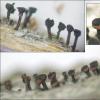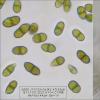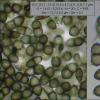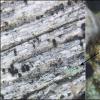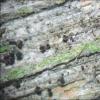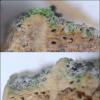
05-02-2026 06:43
Stefan BlaserHello everybody, Any help on this one would be mu

03-02-2026 20:44
Zetti MarioWhen I first saw this white mould on an Agaricus s

18-08-2025 15:07
 Lothar Krieglsteiner
Lothar Krieglsteiner
.. 20.7.25, in subarctic habital. The liverwort i

02-02-2026 21:46
Margot en Geert VullingsOn a barkless poplar branch, we found hairy discs

02-02-2026 14:55
 Andgelo Mombert
Andgelo Mombert
Bonjour,Sur thalle de Lobaria pulmonaria.Conidiome

02-02-2026 14:33
 Andgelo Mombert
Andgelo Mombert
Bonjour,Sur le thalle de Peltigera praetextata, ne

31-01-2026 10:22
 Michel Hairaud
Michel Hairaud
Bonjour, Cette hypocreale parasite en nombre les

02-02-2026 09:29
 Bernard CLESSE
Bernard CLESSE
Bonjour à toutes et tous,Pour cette récolte de 2

01-02-2026 19:29
 Nicolas Suberbielle
Nicolas Suberbielle
Bonjour, Marie-Rose D'Angelo (Société Mycologiq
Found these apothecia growing on old wood of Quercus.
Size up to 1 mm high.
I have come to define the genre as Calicium, but it is difficult for me to determine the species. I think it can be C.salicinum, but I wish someone confirm or reject my hypothesis.
Thanks in advance, greetings.
Susana (Spain)
No problem or C. salicinum. Nice photos.
Alain
Greetings
Susana
Reviewing the notes of this collect I've noticed that there may be two species of Calicium mixed on the same substrate.
I came back to look at the microscope and I note that there are two types of spores:
1.-spores with spiral ornamentation belonging to the apothecia with brown capitulum and an average size of 8.1-9.1 x 4.2-4.7um, we determine as C.salicinum.
2 -. Larger spores (12.1-13.3 x 5.9-6.5um) with warty ornamentation and irregular cracks, belonging to the totally black apothecia (top left image macro).
These last apothecia could belong to C.abietinum?
Thank you, greetings
Susana
Amazing !
Ascospores are fissurate-areolate, >12 µm, yes it'sprobably C. abietinum. A very interesting collect !
I suppose that you haven't seen thallus ?
But you also should look towards C. denigratum. Compare the to descriptions to choose.
Alain
First, I have no experiencie in determining this type of fungus.
I looked again the sample.
In my first impression I believed that there was not thallus, I believed it was a very deteriorated surface (Figure 1, left).
Now, I see that appear areas with development of surface thallus (Figure 1, right).
When cut also seems confirmed the presence of surface thallus. One poorly developed thallus.
It would then be C.viride. In two different states of development: young apothecia (brown) and mature (black)?
what do you think?
Thanks
Susana
It's coming more difficult... often Caliciales are associated.
It's not sure that the green granular thallus is the one of the two caliciales (perhaps a third one or another lichen). Calicium viride has a green thallus sometimes granular, but some authors give a different spore's ornementation (I read it could be partially spiraled in C. viride, but sometimes it's said it could be with irregular cracks). Not easy.
Do you want keys for this genus ?
Alain
I used information found on the Internet:
- KEYS TO GENERA AND SPECIES OF Caliciales IN NORWAY (http://www.thavibu.com/caliciales/keyes.htm) and
- Http://lichenportal.org/portal/taxa/index.php?taxon=51834&taxauthid=1&proj=1 for descriptions.
If you have additional information, I would like to receive it.
Thank you very much, greetings
Susana
Hi Susanna,
A few days ago, I found the same lichenized fungus. I think it's Calicium glaucellum. But apothecia shloud be pruinose (white) . I will post photos in database.
Alain

